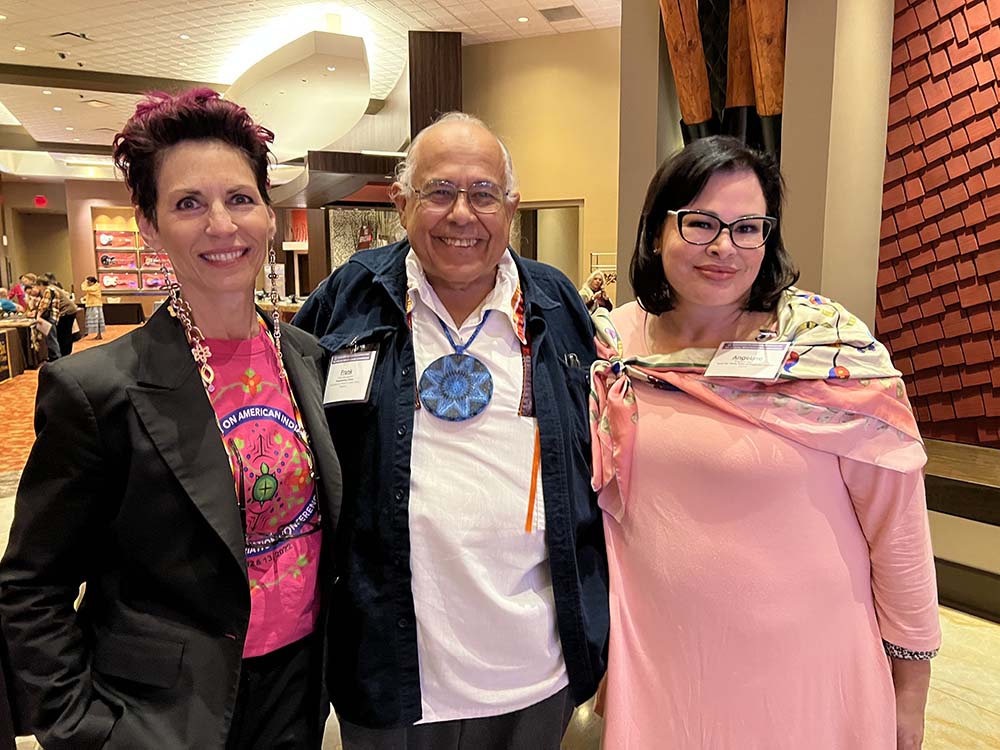
- Details
- By The Association on American Indian Affairs
The Association on American Indian Affairs (the Association) is proud to announce that registration is open for its 9th Annual Repatriation Conference, themed “Building a New Fire.” The theme invites participants to come together to build a new fire that will support new laws and regulations as well as more collaborative methods for undertaking the return of Ancestors, their burial belongings, and sensitive cultural heritage.
"Things have changed. The law has changed, and the public is calling out institutions around the world for their failure to return Indigenous bodies and sensitive cultural and religious items stolen in the name of science, conquest and war," said Shannon O'Loughlin, a citizen of the Choctaw Nation of Oklahoma and the Association's CEO and Attorney. "It is time for a radical change of perspective and time to build a new fire."
Keynote speakers include New York Times bestselling author Angeline Boulley, a citizen of the Sault Ste. Marie Tribe of Chippewa Indians, and former UN Special Rapporteur on the Rights of Indigenous Peoples and Professor of International Law at the University of Colorado Law School, S. James Anaya, who is an Apache descendant. In May, Boulley published "Warrior Girl: Unearthed," a high-stakes repatriation story that follows a young Anishinaabeg woman who uncovers a plot to sell her Nation's stolen Ancestors and sacred items. Anaya is also an author and renowned legal scholar, specializing in human rights law and international Indigenous Peoples' rights, including repatriation.
The Association expects 700 attendees at this three-day hybrid conference hosted by the Citizen Potawatomi Nation at the Grand Casino Resort & Hotel in Shawnee, Oklahoma on November 7, 8 and 9. This is the leading training opportunity in repatriation of Native heritage and will center on providing training on current issues in repatriation including the expected publication of the new Native American Graves Protection and Repatriation Act (NAGPRA) regulations, as well as illegal trafficking and the Safeguarding Tribal Objects of Patrimony (STOP) Act, which was signed into law in December 2022.
Native Nation officials and representatives can register to attend in-person for free, and registration scholarships are available for in-person and virtual attendance. There are also a limited number of exhibitor and vendor spaces for the three-day conference. The hybrid Conference will allow all registered attendees to access the recordings from the three days of training.
The 9th Annual Repatriation Conference registration, hotel information, scholarship application, agenda, t-shirt sales, sponsorship information and vendor and exhibitor registration are available on the Association on American Indian Affairs’ website at Indian-Affairs.org/9thannualrepatriationconference.
Help us defend tribal sovereignty.
At Native News Online, our mission is rooted in telling the stories that strengthen sovereignty and uplift Indigenous voices — not just at year’s end, but every single day.
Because of your generosity last year, we were able to keep our reporters on the ground in tribal communities, at national gatherings and in the halls of Congress — covering the issues that matter most to Indian Country: sovereignty, culture, education, health and economic opportunity.
That support sustained us through a tough year in 2025. Now, as we look to the year ahead, we need your help right now to ensure warrior journalism remains strong — reporting that defends tribal sovereignty, amplifies Native truth, and holds power accountable.
 The stakes couldn't be higher. Your support keeps Native voices heard, Native stories told and Native sovereignty defended.
The stakes couldn't be higher. Your support keeps Native voices heard, Native stories told and Native sovereignty defended.
Stand with Warrior Journalism today.
Levi Rickert (Potawatomi), Editor & Publisher
